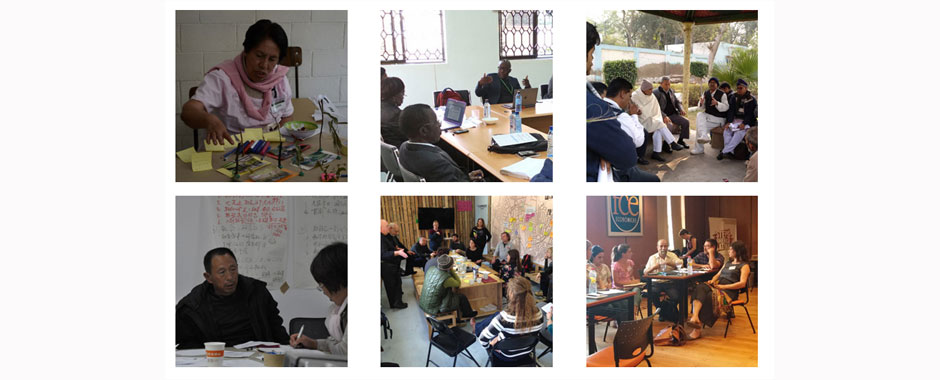These six stories are summaries of T-Labs (Transformation Labs) carried out by the Pathways Network between 2016 and 2018. The project worked in Mexico, the UK, India, Argentina, China and Kenya.
The text is excerpted from the booklet T-Labs: A Practical Guide, published in October 2018. Researchers from the Pathways Network have contributed to each story.
Mexico: Harnessing agency for change
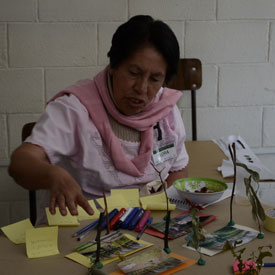 The ecosystem in the wetlands of Xochimilco, Mexico City faces competing pressures from rapid urban growth, tourism, farming and fishing. Urbanisation has driven much environmental degradation, and informal settlements are common. Farmers, government officials, local residents and researchers have different views and visions of the problems that Xochimilco faces, and what should happen to address the degradation in the environment. Despite a history of public policy attention and international recognition, interventions have so far failed to make headway.
The ecosystem in the wetlands of Xochimilco, Mexico City faces competing pressures from rapid urban growth, tourism, farming and fishing. Urbanisation has driven much environmental degradation, and informal settlements are common. Farmers, government officials, local residents and researchers have different views and visions of the problems that Xochimilco faces, and what should happen to address the degradation in the environment. Despite a history of public policy attention and international recognition, interventions have so far failed to make headway.
The research team designed their T-Lab to open up dialogue between different types of stakeholders involved in the area, and to reveal what agency they have. This agency was defined related to how they see the system, the capacities that they have, the social networks within which they act, and their values. Agency Network Analysis was used during the initial research phase to identify different people’s views and relationships, and how they collaborate with others.
The workshops built on this analysis using creative methods, including making ‘avatars’ to represent participants’ abilities and roles, and constructing symbolic maps with materials to represent significant and valued elements of the Xochimilco system. A private social media page was used to share notes and images from the T-Lab, and to provide an ongoing space for discussion.
Contributors: Beatriz Ruizpalacios, Lakshmi Charli-Joseph, Hallie Eakin, J. Mario Siqueiros-García, Rebecca Shelton
Read more: Mexico case study
UK: Connecting a city with local sustainable food
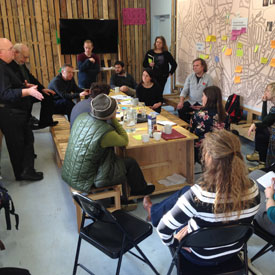 Brighton & Hove, a city on the south coast of the UK, has a population of around 275,000. The UK team set out to discover how small agro-ecological farmers nearby, including on the council-owned Downland Estate, could be supported in supplying the city and creating a more sustainable food system.
Brighton & Hove, a city on the south coast of the UK, has a population of around 275,000. The UK team set out to discover how small agro-ecological farmers nearby, including on the council-owned Downland Estate, could be supported in supplying the city and creating a more sustainable food system.
Initial research found that these farmers were constrained in their ability to reach local markets, and could benefit from more support. Interviews were carried out with local policy makers, retailers, growers on small- to medium-sized farms, and attendees of a seed sharing event. This helped to show how different people viewed the city’s food system, and reveal practices in food growing, buying and so on.
The first workshop, informed by this research, further explored the challenges faced by agro-ecological growers. It involved local growers and buyers, researchers and food activists. Through participatory methods, including an Evaluation H exercise, mapping positive and negative factors, and group discussions, the workshop helped to reveal key concerns, including access to land and coordination of markets, and logistics/distribution systems between producers, retailers, and consumers. These areas – seen as priorities by the T-lab participants – became the focal areas of the next round of research and engagement.
The second workshop focused on how nearby land might be used for agro-ecological production to feed the city. It brought together a larger and more diverse group, including larger-scale farmers, commercial land agents, and representatives from the Council and national statutory bodies – as well as smaller producers, NGOs and the local Food Partnership.
Outcomes included the suggestion of a policy review involving a democratic/ participatory process to identify the ‘purpose’ of the Downland Estate; and mapping the ecological potentials within the Estate, to identify opportunities for food production. A further idea was the establishment of a research and innovation hub involving local academic organisations, farmers and other bodies. A number of linked projects will continue to explore these and related ideas further.
Contributors: Adrian Ely and Elise Wach
Read more: UK case study
Argentina: Opening up seed systems
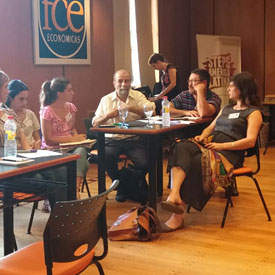 Seed markets are increasingly controlled by a few large companies, and intellectual property regimes that affect seeds are becoming stricter. This has consequences for biodiversity, food production and social justice. The Argentina team set out to investigate how innovations in the seed system could meet the needs of farmers and seed producers.
Seed markets are increasingly controlled by a few large companies, and intellectual property regimes that affect seeds are becoming stricter. This has consequences for biodiversity, food production and social justice. The Argentina team set out to investigate how innovations in the seed system could meet the needs of farmers and seed producers.
Initial research revealed different highly conflicting views of the challenges facing the seed sector, broadly converging around two areas. One set of views emphasised the importance of large-scale agricultural productivity, supported by the country’s private sector. Another set of views emphasised food sovereignty, social economic diversity and a key role for small- and medium-sized farms, supported by an active State. The Argentina research team decided to seek a ‘bridging innovation’ that could address the concerns expressed in both sets of views.
Although originally envisaged around two key events, the process for the T-Lab in Argentina evolved to include three ‘co-design workshops’, as well as a series of smaller, meaningful meetings with stakeholders. The outcome of this process was an ‘open source’ system for seeds – named Bioleft – which would help to challenge restrictions on intellectual property in the seed sector in Argentina. The Bioleft initiative is developing an open licence and an online platform to record and trace the transfer of seed material, and share data about how seeds were performing.
The process involved participation from researchers, agronomists, extension workers, seed breeders from public and private institutions, policymakers, academics, economists, lawyers, filmmakers, IP specialists, consultants and people representing associations of farmers, peasants and indigenous communities. It helped to form a network linking public sector plant breeders and family farming organizations/rural extension workers. The first transfer of seed material under the Bioleft licence was made at a small ceremony in early August 2018.
Contributors: Marcela Basch, Anabel Marin, Patrick van Zwanenberg
Read more: Argentina case study
India: Mobilising for better water in rapidly-changing Gurgaon
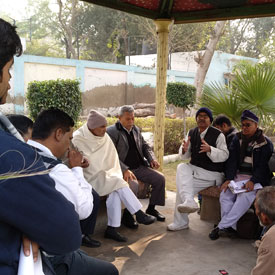 The Gurgaon region to the South-West of Delhi is undergoing a massive urban transformation under the influence of real estate driven processes of development of urban infrastructure and services. Planning, governance and practices for management of water supply do not take into account the growing inequities and unsustainable water management practices. The India research team set out to discover what kind of public engagement could help create a more just and sustainable water management. Background research focused on the impacts of migration, class differences in water access, demand and supply of water, health impacts of wastewater, pollution, drainage and the destruction of local natural water systems.
The Gurgaon region to the South-West of Delhi is undergoing a massive urban transformation under the influence of real estate driven processes of development of urban infrastructure and services. Planning, governance and practices for management of water supply do not take into account the growing inequities and unsustainable water management practices. The India research team set out to discover what kind of public engagement could help create a more just and sustainable water management. Background research focused on the impacts of migration, class differences in water access, demand and supply of water, health impacts of wastewater, pollution, drainage and the destruction of local natural water systems.
The first major workshop of the project explored the conflicts and contested views about the problems of water in Gurgaon. It also aimed to identify measures that could be taken immediately, and to create space for solidarity among the different citizens’ groups involved.
The workshop involved representatives of the two existing federations of Resident Welfare Associations, some trade unions, women’s groups, environmental groups, NGOs, ex ward Councillors, a municipal commissioner, academics, engineers, public-spirited individuals and some residents of the nearby villages and slums.
The direct outcome was the creation of the Gurgaon Water Forum (GWF), including a System Design Group, whose work included investigating the potential for rainwater harvesting in tackling flooding in the area, Technology Generators and Field Groups. Campaigning groups, a trade union and a local radio station promoted the work of the GWF.
Masons and plumbers have been trained in the construction, repair and maintenance of rainwater harvesting structures, and training courses in reedbed technology and solid waste management are planned. Volunteers have been trained to test water quality and a survey of close to twenty settlements has been carried out.
The GWF has established a series of programmes of mass communication through community radio, citizen journalists, citizen science and citizen alerts. Processes to redress grievances are also taking place. This involves the active cooperation of around fifty activists enrolled from among the women, students and workers associated with the members of mobilized public groups.
The long-term objective is to enable the sharing of knowledge and ideas among stakeholders from different parts of society. It is also designed to allow real-world experiments in areas like increasing water access, rationalization of water use, treatment of grey water and the prevention of urban flooding.
Contributors: Dinesh Abrol, Pravin Kushwaha, Bikramditya Choudhary
Read more: India case study
China: What future for workers when factories close?
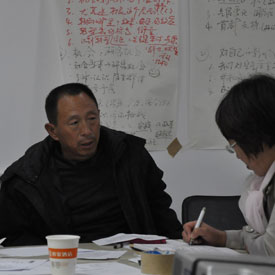 The T-lab in Hebei Province focused on the social impacts of China’s long-term ambitious policy plan to become more environmentally sustainable.
The T-lab in Hebei Province focused on the social impacts of China’s long-term ambitious policy plan to become more environmentally sustainable.
China’s 13th Five Year Plan, which runs from 2016 – 2020, promotes low carbon industries, green finance, environmental monitoring and CO2 emission permit systems. It also sets out a number of initiatives to reduce smog and air pollution and carbon dioxide emissions. In 2012, the government began a crack-down on air pollution in Jingjinji area, where two important cities, Beijing and Tianjin, and one province, Hebei, are located. The researchers focused Luquan, a district in Hebei, where 24 factories had closed since 2013 with a loss of 2,500 jobs.
The T-Lab process included interviews with workers, factory owners, government officials and researchers, as well as two day-long workshops with representatives of the different groups involved. The workshops involved creative methods to allow participants to explore the issues, including simulation, role plays and storytelling. Participants were encouraged to share their own experiences and perspectives, and suggest concrete ideas for change. The second workshop also focused particularly on gender analysis, including more female laid-off workers and their needs and daily experience.
The second workshop also involved a journalist and workers from environmental NGOs. In particular, the District Air Pollution Prevention and Control Office participated – a team which plays a key role in coordinating environmental protection work in Luquan district.
The T-Lab created a space for stakeholders in the system – government officials, NGO workers and factory workers – to meet face to face and listen to each other’s stories and concerns, often for the first time. Government officials appeared to recognise a need to redesign the training programmes aimed at the workers who had lost their jobs, to take more account of their needs.
Contributors: Jiang Chulin and Yang Lichao
Read more: China case study
Kenya: Bringing solar power to the people
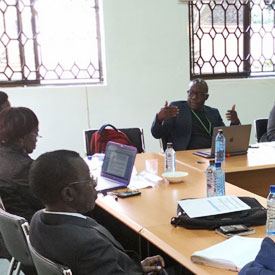 Solar power is gaining popularity as an off-grid source of energy for poor households and small businesses in Kenya. To help with the costs, people can now use a mobile phone-based payment system to access credits and pay for solar home systems over time. The Kenya team set out to investigate how mobile-enabled payments can be part of transformations in low-carbon energy systems that can benefit poor people.
Solar power is gaining popularity as an off-grid source of energy for poor households and small businesses in Kenya. To help with the costs, people can now use a mobile phone-based payment system to access credits and pay for solar home systems over time. The Kenya team set out to investigate how mobile-enabled payments can be part of transformations in low-carbon energy systems that can benefit poor people.
Many non-state actors, including community organisations and some private sector and civil society groups, have seen solar home systems as a promising way to allow energy access for poor people. The Kenyan government has ambitious targets for renewables (100% access to clean and sustainable energy by 2022, of which 80% from renewable sources). But the state prefers to focus on the economic case presented by larger scale energy projects, including geothermal and hydroelectric power, in achieving these goals.
To address these conflicts, the T-Lab process brought together stakeholders with different views and interests (NGOs, the government, civil society groups, private sector development partners, and researchers). The scoping research and first workshop revealed a complex policy landscape, but with a leading role for the state and a continued focus on grid-based energy options. They identified multiple perspectives on what transformation should happen, and various barriers – including costs of setting up solar home systems, the tax regime, e-waste, and the dominance of grid-based solutions in policy and culture.
The use of World Cafés and an interactive, learning-centred approach helped diverse views to be expressed. The process yielded some concrete pathways for action, including using the Kenya Private Sector Alliance to lobby for policies to support solar home systems; a new County Energy Access platform to be established by the Africa Sustainability Hub and its partners; and a new database on the benefits, governance and innovations around mobile-enabled solar energy.
Contributors: Victoria Chengo and Kennedy Mbeva
Read more: Kenya case study
T-Labs: A Practical Guide
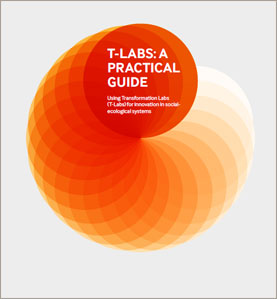 Download this 40-page booklet with practical guidance on T-Lab design and methods, and insights from the Pathways Network.
Download this 40-page booklet with practical guidance on T-Lab design and methods, and insights from the Pathways Network.
T-Labs: A Practical Guide
Using Transformation Labs (T-Labs) for innovation in social-ecological systems
September 2018
